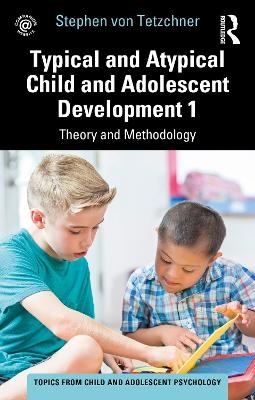
Typical and Atypical Child and Adolescent Development 1 Theory and Methodology
Routledge (Verlag)
978-1-032-26760-9 (ISBN)
The topic books in this series draw on international research in the field and are informed by biological, social and cultural perspectives, offering explanations of developmental phenomena with a focus on how children and adolescents at different ages actually think, feel and act. In this succinct volume, Stephen von Tetzchner outlines the main theoretical perspectives including psychodynamic psychology, behaviorism, logical constructivism, social constructivism, evolutionary psychology, ethological psychology, ecological psychology, information processing and critical developmental psychology. He provides a guide to methods of gaining knowledge about children and introduces child and adolescent disorders.
Together with a companion website that offers topic-based quizzes, lecturer PowerPoint slides and sample essay questions, Typical and Atypical Child and Adolescent Development 1: Theory and Methodology is an essential text for all students of developmental psychology, as well as those working in the fields of child development, developmental disabilities and special education.
The content of this topic book is taken from Stephen von Tetzchner’s core textbook Child and Adolescent Psychology: Typical and Atypical Development. The comprehensive volume offers a complete overview of child and adolescent development. For more information visit www.routledge.com/9781138823396
Stephen von Tetzchner is Professor of Developmental Psychology at the Department of Psychology, University of Oslo, Norway.
Introduction
Part I Developmental Psychology
1. Psychology and Development
2. The Historical Roots of Developmental Psychology
3. Globalization
4. Typical and Atypical Development
5. Recurrent Issues in Developmental Psychology
6. Modeling Development
7. Dynamic Systems
8. Vulnerability, Risk, Resilience and Protection
9. The Developmental Way of Thinking
Summary of Part I
Core Issues
Suggestions for Further Reading
Part II Theoretical Perspectives
10. The Function of Developmental Theories
11. Psychodynamic Psychology
12. Behaviorism
13. Logical Constructivism
14. Social Constructivism
15. Evolutionary Psychology
16. Ethological Psychology
17. Ecological Psychology
18. Information Processing
19. Critical Developmental Psychology
20. Distinguishing between Theories
Summary of Part II
Core Issues
Suggestions for Further Reading
Part III Methods of Gaining Knowledge about Children
21. Observations
22. Questionnaires and Interviews
23. Archival Research
24. Methodologies
25. Special Methods for Studying Infants
26. Criteria for Research Methodology
27. Assessment
28. Ethical Considerations
Summary of Part III
Core Issues
Suggestions for Further Reading
Part IV Child and Adolescent Disorders
29. Categorization of Disorders and Classification Systems
30. Sensory Impairments
31. Motor Impairments
32. Neurodevelopmental Disorders
33. Behavioral and Emotional Disorders
34. Trauma and Stressor-Related Disorders
35. Addictions
36. Acquired Disorders
Summary of Part IV
Core Issues
Suggestions for Further Reading
Glossary
Bibliography
Index
| Erscheinungsdatum | 11.07.2022 |
|---|---|
| Reihe/Serie | Topics from Child and Adolescent Psychology |
| Zusatzinfo | 1 Tables, black and white; 2 Line drawings, color; 7 Line drawings, black and white; 10 Halftones, black and white; 2 Illustrations, color; 17 Illustrations, black and white |
| Verlagsort | London |
| Sprache | englisch |
| Maße | 138 x 216 mm |
| Gewicht | 258 g |
| Themenwelt | Geisteswissenschaften ► Psychologie ► Allgemeine Psychologie |
| Geisteswissenschaften ► Psychologie ► Entwicklungspsychologie | |
| Sozialwissenschaften ► Pädagogik ► Sonder-, Heil- und Förderpädagogik | |
| Sozialwissenschaften ► Pädagogik ► Vorschulpädagogik | |
| ISBN-10 | 1-032-26760-7 / 1032267607 |
| ISBN-13 | 978-1-032-26760-9 / 9781032267609 |
| Zustand | Neuware |
| Informationen gemäß Produktsicherheitsverordnung (GPSR) | |
| Haben Sie eine Frage zum Produkt? |
aus dem Bereich


